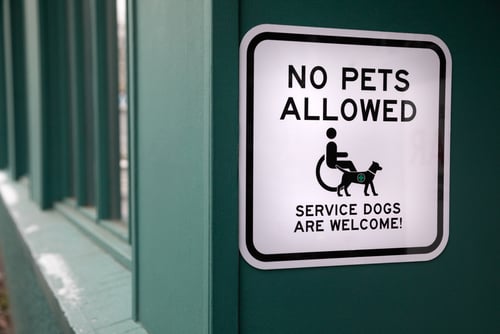
For landlords, keeping good tenants in your rental properties is the ultimate goal. However, it’s hard to know whether your tenant will be good or bad without a tenant screening process. Tenant screening can help you distinguish the quality tenants from the terrible tenants. However, many landlords aren’t sure what questions to ask or how to effectively screen a tenant. Let’s go over some basic principles of tenant screening so you can ensure only the best tenants occupy your rentals.
What is Tenant Screening?
Tenant screening is a process used by landlords and property managers to determine whether or not a tenant is qualified to live in a rental property. Typically, a tenant screening will reveal a renter’s history and current financial status. Additionally, a screening report can tell you whether the tenant has been in legal trouble or has a criminal history on their record.
Screening is essential for landlords and property managers because they may have more than one person interested in a rental property. However, asking a few questions and looking into their rental history is sometimes necessary to decide who the better candidate is. After all, you wouldn’t allow a violent criminal to live in your rental property, especially if they are consistently getting in trouble with the law.
That said, screening every potential renter is crucial in finding quality tenants that will take care of your property just as you would. So next, let’s go over a few things to look for in a new tenant.
What to Look For in a Tenant
Researching a potential tenant may seem time-consuming, but it’s a crucial part of running a rental business. There are several things to look for to find tenants that meet your criteria. Some of the most prevalent factors include:
- Proof of Income
- Creditworthiness
- Criminal Background
- Eviction History
- Solid References
Proof of Income
Seeing a tenant’s employment or proof of income is one of the most critical factors in deciding whether or not to rent to them. Typically, landlords will want to see that a tenant makes equal to or greater than three times the monthly rent. If a potential renter can’t prove their income or employment status, it could be a significant red flag. In addition, you want to have a tenant that can pay their rent in full and on time each month.

Creditworthiness
Another factor in choosing a quality tenant is looking at their credit history. Although a high credit score is sought after, a good credit score doesn’t always equal a good credit history. Make sure to check for late payment history, large debts, or any accounts sent to collections. If any of these issues pop up, it could indicate that your tenant may fall behind on rent payments.
Criminal Background
No landlord is looking to house a criminal or someone that would put the community in danger. Running a background check is vital before signing a lease with a tenant. To ensure your tenant will not be of harm, run a background report for at least the past seven or more years. Additionally, focus on drug charges or violent crimes that may put other residents or the property at risk.
Eviction History
If an applicant has a history of evictions or lease violations, it’s a huge red flag for landlords. Nobody wants to house a tenant that will violate the lease or get evicted for nonpayment of rent, damages, or illegal conduct. Ensuring that the tenant has no prior evictions or lease violations is a good start in finding a quality tenant. If they have prior evictions or lease violations, you may want to start looking through other applicants.
Solid References
Finally, if a tenant can give you at least one to three solid references, that’s a great sign. Take the time to ask their previous or current landlord a few questions about their tenancy. Thus, allowing you to get a better idea of what they will be like as tenants. On the other hand, if their references are insignificant or don’t have anything good to say, it’s another red flag.
Common Questions to Ask During a Tenant Screening
Although you may have done your research on a rental applicant, you’ll still want to meet with them in person before signing a lease agreement with them. While meeting in person, there are several questions to ask prospective tenants to ensure they will be a good fit for your rental. Some of the most common questions include:

- What is Your Desired Move-in Date?
- Can You Commit to a One-Year Lease?
- Do You Own Any Pets?
- Why Are You Looking to Move?
- How Many Occupants Will Live Here?
- Do You Smoke?
What is Your Desired Move-in Date?
One factor that all landlords should know is when the tenant wants to or plans to move in. Typically, a landlord will advertise a property before the current tenant leaves to reduce vacancy time. If the prospective renter plans to move before the property is available, there’s no need to continue the application process.
Additionally, if the property is available immediately and the prospective renter doesn’t plan on moving for a few months, it inconveniences landlords.
Can You Commit to a One-Year Lease?
Most leases are at least one year long. However, not all tenants want to be tied down to a year-long agreement. By laying out this standard immediately, landlords can weed out applicants who aren’t interested in a 12-month lease and focus on those that are.
Do You Own Any Pets?

Not all landlords are open to housing pets along with tenants. However, sometimes it depends on the type of pet. That said, even if you do allow pets on the property, it’s a good idea to ask a few questions, such as:
- How many pets do you have?
- What type of pet(s)?
- Pet size and weight
Knowing this background information about a pet can help landlords decide whether or not they can live on the property. Then, you can come up with a pet deposit or an additional pet rent if you are concerned about damages.
Remember that service animals are not considered pets, and landlords cannot refuse a service animal, even if the property is not pet-friendly.
Why Are You Looking to Move?
Asking your prospective renter why they are looking to move can give you a better idea of their current living situation and how they handle it. The reasons for moving could be anything. For example, maybe the tenant just got married, is relocating for school or work, or simply wants a change of pace in a new town. No matter the reason, it can give landlords a better idea of what their potential tenant is looking for.
How Many Occupants Will Live Here?
Before you go through the screening process with a rental applicant, check your local occupancy limits. Then, ask the tenant how many occupants they plan on living with and see if the laws align with their expectations. That said, anyone over 18 will need to fill out an application and go through the screening process as well since they are considered tenants. Children under 18 are not considered tenants, so they do not have to fill out an application to live on the property but should be listed on the lease as occupants.
Do You Smoke?
Many landlords have strict smoking policies in place at their rental properties. These days, vaping is extremely prevalent as well. Ask the applicant if they smoke or vape and let them know your rules regarding these policies. The issue with this question is–not everyone will be honest. So, even if they say no, let them know the smoking policies and reiterate the consequences of smoking in the rental property.
Avoiding Fair Housing Violations During Tenant Screening
All landlords should be mindful of fair housing violations during the tenant screening process. After all, if landlords are found violating fair housing laws, they could be subject to severe financial and legal consequences. Here are some tips for avoiding fair housing violations:

- Remain consistent with each applicant- One way to remain fair to all applicants is to be consistent. Keep the same standards, and qualifications, and ask the same questions to each rental applicant.
- Word things carefully- Sometimes, the way you word things can get you in trouble. To avoid any violations, be careful with the way you say verbally and in writing. Additionally, the questions you ask during a screening must be appropriate. For example, don’t ask someone about their nationality or whether or not they have a disability.
- Hire property management- One way to ensure fair housing compliance is by hiring property management in Baltimore. Property managers can ensure thorough tenant screening that complies with all local, state, and federal housing laws.
Need Help With Tenant Screening?
Landlords are extremely busy, so it can be hard to set aside time to screen each rental applicant. Luckily, local rental property managers can handle this process for you. Like the experts at Bay Property Management Group, hiring a trusted team of professionals is a great way to streamline your rental business.
Whether you need help with tenant screening, rent collection, rental registration, and more, BMG has all your rental needs covered. Contact us today if you need rental management services in Baltimore, Philadelphia, Northern Virginia, Washington DC, or other surrounding counties.
